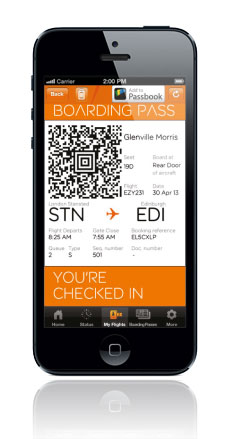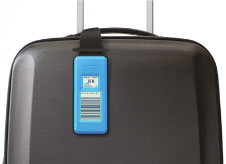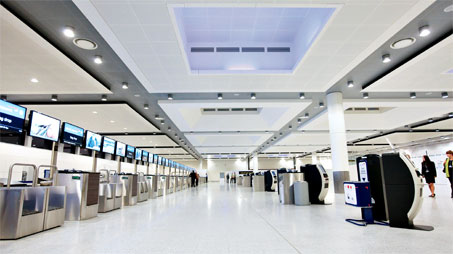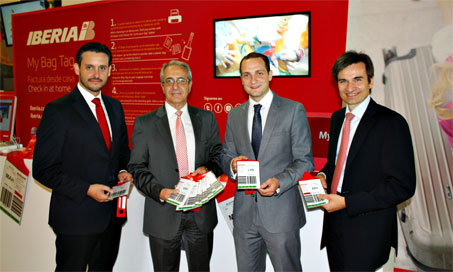
The always-connected passenger wants access to their travel documents via their smartphone, which is why the likes of easyJet have introduced a mobile boarding pass, as an alternative to the traditional paper document.
Air travellers have never been as empowered as they are today. Self-service solutions – ranging from mobile check-in and bag drop, to self-boarding and automated border control – along with the proliferation of smartphones and tablets, have created a new type of passenger; a passenger that wants to self-process and who expects easy access to the information they want, exactly when they need it. Like it or not, for airports and airlines, this is a trend that is only set to strengthen in the coming years.
“In 2020 and beyond, we all expect that self-service will be the main method for passengers to arrange and undertake travel,” explained Giorgio Medici, Customer Care Manager at SEA Aeroporti di Milano, and Chairman of the ACI EUROPE Facilitation and Customer Service Committee.
“We can expect less kiosks in terms of points where passengers carry out airport procedures and things will run even more on web and mobile devices away from the airport terminal.”
Passengers’ desire to carry out as many of the processing tasks as possible away from the airport is clear from the recent developments in areas such as check-in and baggage.
Iberia has introduced home-printed bag tags and British Airways is developing an electronic permanent bag tag, both of which allow the passenger to simply deposit their bag at a bag drop unit upon arrival at the airport, rather than queuing up and waiting for an agent to tag the luggage.
While online check-in has been around for more than a decade, travellers have more recently demanded that boarding passes are available on their mobile phones. Such is the demand, even low-cost carriers, led by easyJet and soon to be followed by Ryanair, now offer mobile boarding passes.
More mobile, less kiosk

British Airways is currently undertaking operational trials on an electronic permanent bag tag, which can be updated using a smartphone and re-used for numerous journeys.
Rob Broere is part of the International Air Transport Association (IATA) Simplifying the Business (StB) Steering Group, which aims to identify how the air transport industry can offer better service to passengers while also lowering costs, and he expects this move towards automation to be a permanent one.
He said: “Self-service is moving more and more to customers’ own devices and that will continue. The basic check-in kiosks, as well as the standard check-in desk, will slowly reduce in importance.
“However, the key is that the processes behind the scenes also move forward to avoid just moving some activity from one place to another. For instance, with online check-in, for hand baggage-only passengers it moves significant parts of what used to be done at check-in, like the document-related processes, to the gate, which does not really help the airline in this time-critical process.”
Even if there is a risk that processes are just being moved from one part of the airport to another, it is certain that landside processing is changing drastically. So, with such a focus on offering the passenger a ‘do-it-yourself’ travel experience in the early part of their journey, for how much longer will we need check-in agents based at the airport? “My opinion is that automation can be trusted by the passenger if they feel that behind the automation there are people working for them,” Medici said. “Airlines have less and less people working at the airport, but with VIPs and First or Business passengers, for example, they expect to see people, so automation alone will not do.”
Improving data exchange

Although passengers have increasingly favoured kiosks over check-in desks, Medici explained that “we can expect less kiosks in terms of points where passengers carry out airport procedures”, due to an increasing preference for web and mobile processing. (Photo copyright: British Airways)
For Broere and the other members of the StB Steering Group, among the key areas of focus at the moment are establishing how airlines can improve customer interaction at any time in any location, establishing common standards around the new forms of bag tags, and implementing biometrics into more parts of the travel process. An overarching theme, though, is how the industry can improve the handling of data exchange.
“It is not uncommon for a passenger on an international journey to show their passport seven times and their boarding pass eight times,” Broere said. “Each time, you are being looked at as an unknown case, even if you are a top tier frequent flyer. This makes no sense. As an industry, and that includes not just the airlines but also partners like immigration, security and airports, we need to get better at recognising our customers and providing the information they need, when they need it and where they need it, and only ask them for relevant data.”
This need to make better use of data between all stakeholders is a point echoed by Medici, who said airlines must take some responsibility for enabling it. “We need airlines to help airports plan resources correctly,” he said. “At the moment, airlines have their information on their own systems. Some of the suppliers are trying to provide platforms so airports and airlines can move towards storing and sharing data on a common platform and this is what we need to do.”
A more personal experience

Dimitris Bountolos Montabes, Iberia’s Vice President of Customer Experience; Fernando de Miguel Rodriquez, Iberia’s Madrid-Barajas Airport Director; ACI EUROPE Airport Business’ Ryan Ghee; and Marco Sansavini, Iberia’s CCO, at the launch of MyBagTag in July. Home-printed bag tags are expected to become a more common feature of the travel experience in the coming years.
As for the airlines, more effective sharing of data can open the door to a higher level of personalisation, which can be leveraged to the benefit of the passenger even when they are onboard. Highlighting Emirates – his employer – as a leader in this area, Broere explained that inflight internet access and passengers being allowed to use smartphones during the flight open “a whole new set of opportunities to make the customer interaction more personal and relevant”.
While we can certainly expect the rise of smart devices, the increase in self-service offerings and the better sharing of data between all parties involved in the travel process to positively change the face of the end-to-end travel experience beyond 2020, Medici concluded that we must keep a focus on the here and now. “As soon as passengers become even more confident with mobile technology and automation, it will become the common processing method,” he said. “However, the revolution is already in place.”







